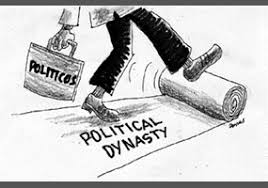Anisha has done MBA in Marketing from NMIMS And Executive Management(PMNO) from Harvard Business School. She has been instrumental in growing CATKing Digital with her experience with Marico and Henkel in the past.
Most countries have political dynasties, but still, we have very limited evidence on how they affect our economy. Hereditary succession in politics is a reality. It is present not just in a democracy like India, but also autocracies like North Korea.
Get your GDPI sort with us
India has a substantial number of political dynasties present at all levels – both local and national. Some of the much-noticed ones are the Nehru – Gandhi dynasty, the Scindia family, the Abdullah family, the Yadavs of Uttar Pradesh, the Karunanidhi family, etc. All these are the famous names we know on a national level. The local hierarchies include Gogoi of Assam, Jogi and Shukla of Chhattisgarh, and Mahto of Jharkhand, and these are just a few to name. India has a rich share of political dynasties. The primary reason for this is rooted in the nature of Indian politics. It is more personalized.
The people seldom identify with political parties, they connect more with people, the stories they say and how much they can relate to the people’s life. So once the audience has connected with a particular individual, the vote is secure and the successors can build their way up on these votes.
When we talk about dynastic politics, these people are in the game for the long term. They are stationary. The groundwork that they do is reaped by their descendants. Acquiring state power helps the dynast protect his/her interest. Dynastic politicians are seen to underperform because their place is secure in the system. In 2012, a study by Roland Mendoza, an economics professor at the Asian Institute of Management in the Philippines, found that constituencies ruled by dynasts tended to have more poverty and higher income inequality. A year later, in their paper The Effect Of Political Dynasties On Effective Democratic Governance: Evidence From The Philippines, Rollin Tusalem and Jeffrey J. Pe-Aguirre had similar findings, noting that provinces dominated by family clans were less likely to perform well in terms of infrastructure development, health spending, criminality and employment.
Refer for more Group Discussion Topics
Although some may argue the research is done for the Philippines and is not applicable in the Indian context, we can still see the similarities in the economy – both countries are overpopulated, face underemployment, and both are growing economies. A recent Harvard paper, Understanding The Economic Impacts Of Political Dynasties: Evidence From India, by Siddharth George and Dominic Ponattu, analysed night-time luminosity as a measure of economic growth to find that constituencies, where dynasts won, grew 6.5 percentage points slower annually than constituencies where dynasts lost.
Dynasts capturing the politics rule out the chances of better-performing individuals entering and doing good for the state. It limits the choice of the voters. With no other options, even though the people want to topple over the dynasties, they are not able to do so. Weak institutions enable dynastic politics. Political dynasties are also known to play with the religious sentiments of the people. A Dalit dynasty will favour only the Dalits and try to include them in his/her vote bank. These divisional politics is imperative for the sustenance of a dynasty. How will people pledge their allegiance if they don’t relate to the candidate?
There is another form of dynastic politics called the concurrent dynasty. It has several members of the same family in politics at the same time. A very good example of this is the Yadav clan of Uttar Pradesh. Mulayam Singh Yadav has his son as the Chief Minister of Uttar Pradesh, and at the same time his daughter, brother, and nephew are also fighting elections from different districts of the state. Democratic dynasties are expanding laterally, which is evident in the number of leaders who are being elected as their relatives, siblings, or children.
Dynastic politics is harming the country by stagnating the power in the hands of a few. Without rotation of power and the fear of losing it, there is little or no accountability of the leaders. As discussed earlier, political dynasties exist in India in various forms and of various degrees. It not only makes the agenda shift from the “welfare of the state” to the “welfare of the clan”, but also dilutes the essence of democracy with corruption and favouritism.
It leaves the voters with less choice and hinders development by first filling the treasure chest for the family and then distributing the remains to the citizens. The moral measures used to ensure cohesiveness in the different units of a party sometimes lead to grave consequences like religious disruption. The more we prefer the dynasts, the more we are giving in to the power of dirty divisional politics and we, as educated citizens should be aware of this fact. We should try to break free from this trap and lead our country to a better future with more abled leaders.
Also Read: What are some tips for someone appearing for the CAT? What is a preparation strategy?



Comments are disabled for now